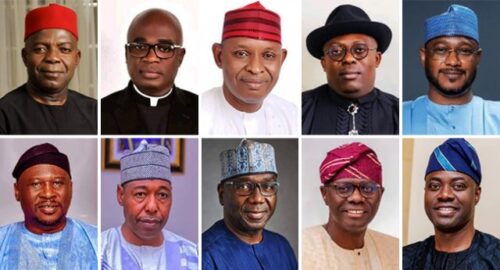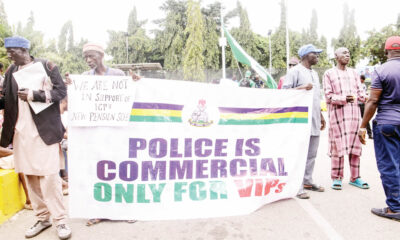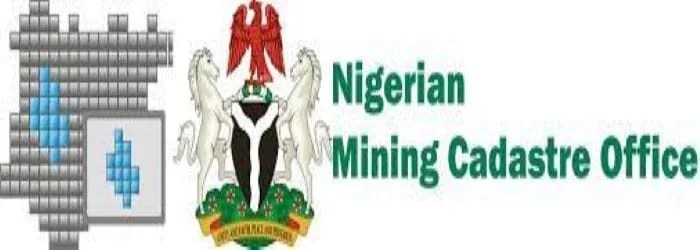The National Economic Council (NEC) has received recommendations from sixteen state governors endorsing the creation of state police.
Additionally, they suggested amending the constitution to permit the establishment of state police.
The papers were among the materials presented at the 140th NEC meeting, which Vice President Kashim Shettima chaired on Thursday at the Aso Rock Villa in Abuja.
This was made clear in a statement Stanley Nkwocha, Special Advisor to the Vice President on Media and Communications, written on Thursday and headed “NEC endorses take-off of $617M i-DICE programme across states.”
NEC is still awaiting findings from 20 states, the document claims. It conveyed assurance that other people would help.
Section 153(1) and Paragraphs 18 and 19 of Part I of the Third Schedule of the 1999 Constitution (as amended) provided the framework for the creation of the NEC. The Governor of the Central Bank, the 36 state governors, and other appropriation-based government officials make up its membership.
The Vice President serves as the chair of the NEC, which meets once a month to carry out the Vice President’s mandate to provide advice to the President on matters pertaining to the Federation’s economy, particularly on actions required to coordinate the various Governments of the Federation’s economic planning initiatives or programmes.
The Vice-President’s spokesperson, Nkwocha, revealed the talks that took place at the NEC on Thursday. He stated that the “Secretary to NEC (Mr. Nebeolisa Anako) made a presentation on submissions by states on the state policing initiative.”
Reports have been received by 16 states on the establishment of State police. 20 states have yet to send in report. All states across the country expressed their support for the establishment of state police for the following reasons.
“States made presentations in support of the creation of state police. States recommended changes in the constitution and the current policing structure to enable the operationalisation of the initiative.”
However, no details were given about the specific states. The Vice President’s spokesperson had affirmed that the total number would be presented at the next NEC meeting even as “the compilation is still going on”.
This comes weeks after the Federal and state governments, on February 16, 2024, resolved to develop modalities to create state police to tackle the country’s security crisis.
Meanwhile, the nation has been wracked by waves of abductions, attacks by suspected bandits and other violent crimes, reviving calls for the establishment of a multi-level policing system, including state police.
Bandits have in recent times 495 persons in Kaduna, Sokoto and Borno states.
On March 7, over 280 pupils and teachers of Government Secondary School and LEA primary School at Kuriga, Kaduna State, were kidnaped.
The terrorists reportedly invaded Kuriga in Chikun Local Government Area, Kaduna, shooting at their targets before whisking away the pupils and teachers from both schools.
A day earlier, the United Nations confirmed the abduction of at least 200 internally displaced persons from their camp in Ngala Local Government Area of Borno State.
The UN resident and humanitarian coordinator in Nigeria, Mohamed Fall, in a statement said the abductees, including women, boys and girls, were captured while fetching firewood. Fall added that the terrorists released some older women and children below 10 years.
On March 9, bandits reportedly kidnapped no fewer than 15 Tsangaya students at Gidan Bakuso area of Gada Local Government Area in Sokoto State.
On March. 14, at least 17 Nigerian soldiers were killed while on a peace-keeping mission to douse clashes between Okuoma and Okoloba communities in Ughelli South Local Government Area of Delta State.
On February 20, bandits kidnapped over 26 travellers along the Gusau-Sokoto highway. They were said to have blocked the road around Kwaren Kirya village under Maru Local Government Area of Zamfara State and abducted travellers from a Toyota 18-seater bus and a Volkswagen golf vehicle.
At President Tinubu’s meeting with the governors last February, the Federal Government and states agreed to recruit a yet-to-be-disclosed number of forest rangers and invest in more training to “keep our forests and our borders safe,” said the Information Minister, Mohammed Idris, when he briefed State House Correspondents after a meeting between Tinubu and the 36 state governors.
“The Federal Government and the state governments are mulling the possibility of setting up state police,” said Idris, adding that “this is still going to be further discussed.”
He explained, “A lot of work must be done in that direction. But if our government and the state governments agree to the necessity of having state police, this is a significant shift.”
“Like I said, more work needs to be done in that direction. A lot of meetings will have to happen between the federal government and subnationals to see the modalities of achieving this,” Idris noted.
On February 20, 2024, a bill proposing the creation of state police successfully passed the second reading at the House of Representatives.
The legislation titled, ‘A bill for an Act to alter the constitution of the Federal Republic of Nigeria, 1999, to provide for the establishment of State Police and related matters,’ was slated for a second reading before the end of this week.
Backed by 13 House members, the bill gained the majority’s favour in the Green Chamber, with many lawmakers arguing that the security challenges take preeminence over concerns about political victimisation by state governors.
Meanwhile, the Presidency has said although President Bola Tinubu has given his nod for the creation of state police outfits and forest guards, Governors would ultimately determine the success of both moves.
It also said it expects the re-opening of the Nigeria-Niger border to fight the illegal influx of arms roaming the Sahel from the conflict in Libya.
Speaking exclusively with our correspondent on the issue, a presidency official who did not want to be named said, “The President told the state governors to discuss it further at the state level. A committee was set up for that. We have not heard from the committee yet. Don’t also forget that simultaneously, the national assembly is considering inserting state policing in the constitution. So, there is a consensus around state policing.
“As for the forest guards, work is going on with it. There are existing forest guards in several states, but they are under the states’ ministries of agriculture. The goal now is to strengthen their capacity by arming them properly and recruiting more people.
“Still, it all falls in the hands of states to strengthen the forest guards. That is where we are now.”
Another Presidency official who spoke on condition of anonymity said the opening of the Nigeria-Niger border was part of efforts to stall the proliferation of the small arms and light weapons non-state actors use for their enterprise.
“What I know is this: some people have linked our security problems to the situation in Libya. The Libya conflict has led to the flow of arms to Nigeria. We share a long border with Niger. And many arms are flowing into the country.
“Our borders with our Sahelian neighbours are largely ungoverned. So, there are many arms in the hands of this bandit.
“We had to make peace with Niger because of this. It was an attempt to appease Niger. We share the same border. If we are not at peace with them, they may ignore the arms flowing in. Even the food shortage we are talking about, many goods come from Niger to Nigeria. We exacerbated things when we shut the border,” the official said.
In a similar development, the Nigeria Governors’ Forum, in a communique its issued at the conclusion of its virtual meeting, and signed by its Chairman, Kwara State Governor AbdulRahman AbdulRasaq, dated Wednesday and made available to the press on Thursday, emphasised the importance of incorporating State policing as a crucial amendment in the ongoing 1999 Constitutional Amendment process to address a fundamental flaw in the national security framework.
The communique read in part “The Forum commiserated with the Governor of Delta State, H.E Sheriff Oborevwori, over the communal clash between Okuama in the Ughelli South Local Government Area and Okolaba in the Bomadi Local Government Area of Delta State, and which led to the death of many including 16 military personnel. While condemning the heinous act, members observed a minute of silence for the souls of the departed.
“Members reviewed the progress of the National Minimum Wage Committee and ongoing multi- stakeholder engagements towards agreeing on a fair minimum wage.
“Members urged the NMWC to consider the current realities, individual State peculiarities and consequential impact on the capacity of the government as well as private sector employers to pay. Members also emphasized the need for proposals to be data- driven and evidence-based.
“The Forum highlighted the need for State policing as a critical amendment in the ongoing 1999 Constitutional Amendment proceedings to correct a fundamental flaw in the national security architecture.”
The debate for creating state police in Nigeria primarily stems from the centralised nature of the Nigerian Police Force, which many security pundits perceive as inadequate for addressing the unique security challenges across the country’s diverse regions.
Proponents argue that the outfit would bring law enforcement closer to the communities they serve, enhance the effectiveness of policing, and allow for more localised control over security matters.
However, opponents fear that state police could lead to the abuse of power, particularly in states with strong political control, potentially exacerbating regional tensions and undermining national unity.

 BIG STORY4 days ago
BIG STORY4 days ago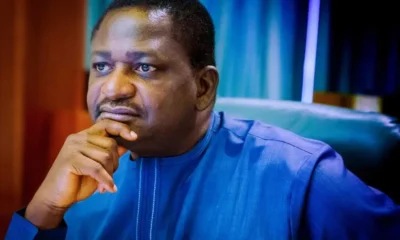
 BIG STORY5 days ago
BIG STORY5 days ago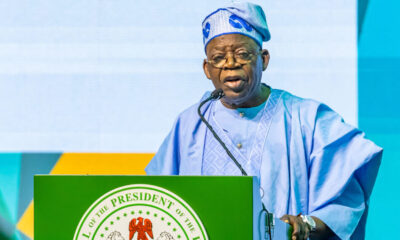
 BIG STORY2 days ago
BIG STORY2 days ago
 BIG STORY5 days ago
BIG STORY5 days ago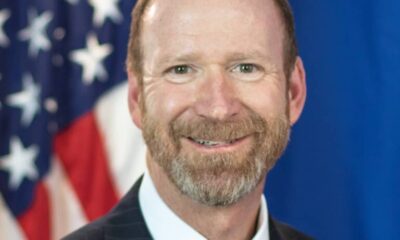
 BIG STORY5 days ago
BIG STORY5 days ago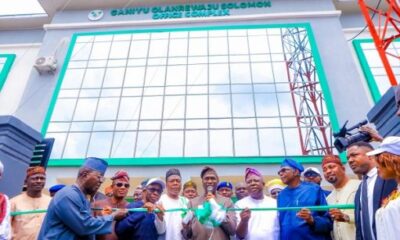
 BIG STORY5 days ago
BIG STORY5 days ago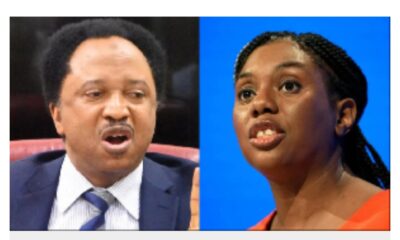
 BIG STORY2 days ago
BIG STORY2 days ago
 BIG STORY5 days ago
BIG STORY5 days ago




